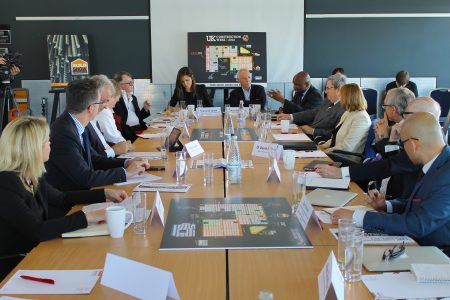The construction industry needs to adopt a factory mentality to overcome many of the challenges it now faces – and the government itself has a responsibility to help the sector attract more talent. So was the consensus, at a recent cross-industry advisory panel hosted by UK Construction Week.
Attended by leading figures across architecture, engineering, contracting and housebuilding, the lively debate sought to address the key issues facing the industry today – the skills shortage, diversity, the housing crisis and the reputation of the sector itself.
The event was chaired by property developer and Built by Her campaigner, Marta de Sousa, who began discussions by asking the panel how the industry was going to attract the reported 36,000 new workers the industry needs per year, to meet current demands.
Shortermism, a result of the industry being so exposed to economic pressures is a major barrier, said David Cowans, Group Chief Executive of Places for People. A boom-bust cycle sees construction workers the first to be sacked in a recession and somehow we need to stabilise this volatility. The industry’s sensitivity to uncertainty is undoubtedly an issue, agreed Allan Wilén, Economics Director of Glenigan, citing the number of projects that have been put on hold, most likely awaiting the outcome of the referendum.
Dr David Hancock, Head of Construction at the Cabinet Office, identified a need to build differently. The panel agreed; the industry needs to move away from its traditional mindset and skillset; and for the housebuilding sector in particular, off-site manufacturing of pre-fabricated buildings is most certainly the answer – if we could only overcome some deep-seated negative perceptions.
It was a belief passionately held by L&G Homes CEO, Tom Ground, who saw computer-controlled factory environments as a means of also improving diversity in the workplace: Eliminating the need for heavy-lifting is key – moving away from a way of working that requires above average strength opens up opportunities for all.
Dr Diana Montgomery, CEO of the Construction Products Association, agreed. With an organisation that spans manufacturing and construction, she sees quite clearly the divide – there is no skills shortage in manufacturing and the industry benefits from a much more diverse workforce, due to the different working conditions.
Additionally, Diana felt that ‘brand’ made a difference – with a call for individual companies within construction to work harder to build theirs. Manufacturers, she felt, were better at creating an aspiration to work for them – and rather than the construction industry as a whole looking to improve its reputation, wouldn’t it be more effective for individual companies – large and small – to work on their own brands and attract people based on their intricacies?
Bola Abisogun, Founder and Executive Director of Urbanis Limited, certainly agreed that the smaller companies have a vital role to play in encouraging the next generation into the industry – and felt that there needed to be better dissemination of work. To him it is actually an ‘alleged’ skills shortage, brought about by the larger companies winning the majority of the work then needing to recruit to deliver – whereas at grass roots level there is still a lot of capacity.
Peter Murray, Chairman of New London Architecture, said much more had to be done by the industry as a whole to generate understanding of its contribution. Role models are key, thought Stephen Hodder, RIBA Immediate Past President & Client Ambassador, with Mike Petter Chairman of the Considerate Constructors Scheme concurring, particularly in a climate where he felt youngsters were actually actively discouraged to enter the industry.
Isn’t it crazy, mused Nathan Baker, Director of Engineering Knowledge at the Institution of Civil Engineers, that accountancy is more appealing a career to youngsters than working in construction?
Richard Poulter, Deputy Managing Director at Wilmott Dixon Construction Ltd, said it was about joining the dots – bringing role models and brand stories together to create a compelling narrative.
Chris Wilkinson, founder of WilkinsonEyre, felt the government had a role to play. The built environment is everything we know – it’s about quality of life and therefore the government needs to take more responsibility for ensuring we have the necessary skills.
Although all agreed with Pauline Traetto, Director of BRE Academy, that there has never been a better climate in which to promote the industry, Christine Townley, Executive Director of Construction Youth, pointed to fragmentation as a problem. We have many disparate groups and some fantastic examples of projects aimed at improving the reputation of the industry and attracting talent but they are working in silos – we’re not currently benefiting from any culminative mass.
Alex Naraian, Associate Director, Adam Architecture & CIAT South East Region Councillor, suggested that every trade association should appoint a key individual whose role it is to liaise with all other trade associations to form a collaborative voice.
Aileen Woolhead, non-executive director of Whitely Homes, concluded that fragmentation of the industry as a whole, was a bigger issue – with compartmentalisation a real barrier to the effective delivery of projects and the complexities sometimes baffling to end clients. Agreed, said David Cowans – we need to start selling based on outcome, and how we get there should be our problem, not our clients’.
Nathan Garnett, Event Director for UK Construction Week, was enthused by the discussions. “Against a backdrop of some seemingly major issues, the feeling was one of optimism, with a general consensus that the time has never been better to drive innovation and change mindsets across the industry.
“And I very much feel that UK Construction Week has a role to play in this. By bringing together leading thinkers and innovators under one roof, we are creating the ideal opportunity to promote all that is great about the industry, showcase the UK as leaders in the construction industry, drive change and to attract new talent. UK Construction Week can be a unifying voice. Today’s discussions will feed into our plans, enabling us to create a platform that can be leveraged by the industry as a whole to promote itself and its wider societal contribution.”
Taking place at the Birmingham NEC from 18 – 20 October, UK Construction Week combines nine shows in one location. With over 24,000 trade visitors last year – a figure expected to double at this year’s event – the show boasts over 1,000 exhibitors. Visitors are able to attend Timber Expo, the Build Show, Civils Expo, the Surface and Materials Show, Energy 2016, Plant & Machinery Live, HVAC 2016, Smart Buildings 2016 and Grand Designs Live.
For more information please visit www.ukconstructionweek.com or follow @UK_CW on Twitter.
To watch a video summary of the advisory panel please visit https://youtu.be/qtQMU0e27z8







